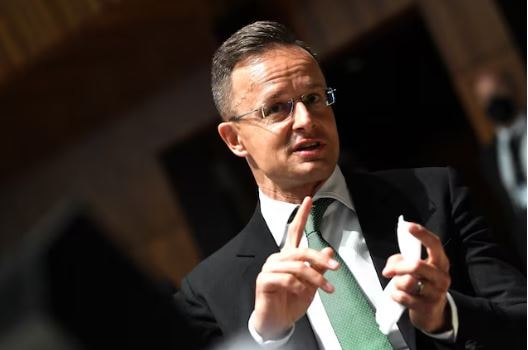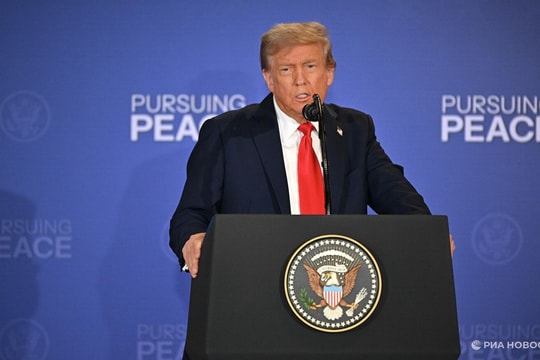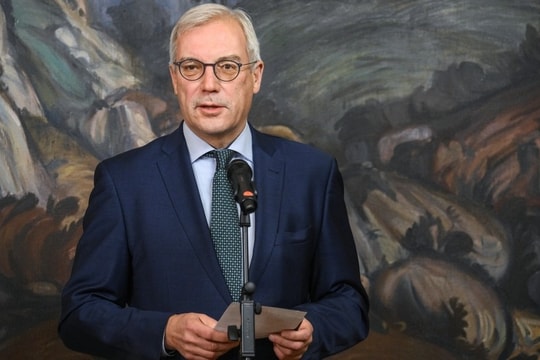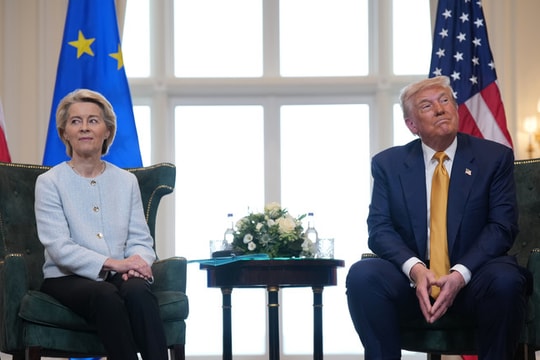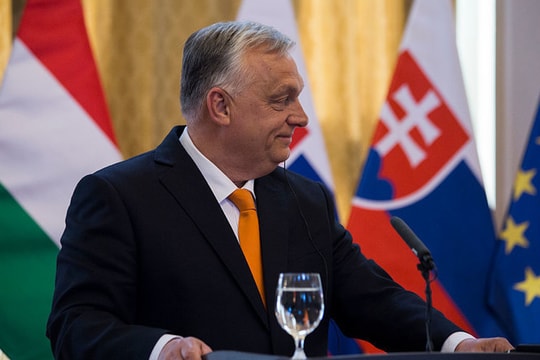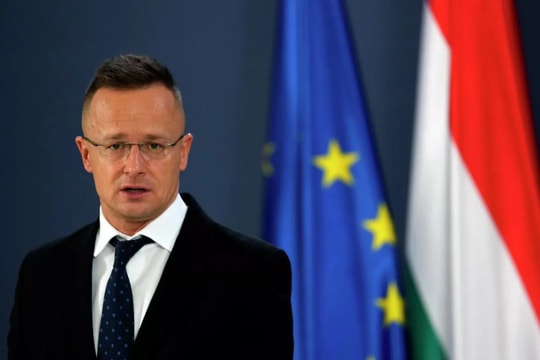Germany - England under two 'female generals'
(Baonghean) - British Prime Minister Theresa May recently visited Germany and met with her host country counterpart Angela Merkel. Considered a difficult meeting as Britain has decided to leave the European Union (EU), the two female Prime Ministers have shown that they have a flexible approach to the Brexit issue, laying the foundation for a strong UK-Germany relationship under the two "female generals".
The "historic encounter"
Although Theresa May is no stranger to senior politics and this is not the first time she has met German Chancellor Angela Merkel, this is the first time the two have met as two female heads of state.
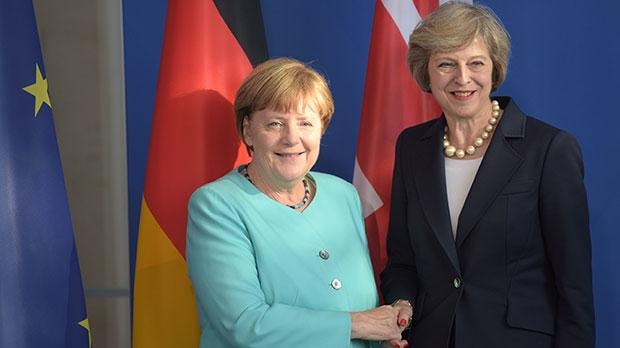 |
| The historic meeting of two “female generals”. Photo: Telegraph |
Public opinion immediately turned to the time when Angela Merkel visited the UK for the first time as German Chancellor. At that time, she was compared to “Germany’s Margaret Thatcher”. Now, she has become a model for comparison when people call Theresa May “Britain’s Merkel”.
No matter how they compare, the most common point is that both are considered "iron ladies", surpassing many men to become the leaders of two major economies in both the continent and the world.
In their private lives, Angela Merkel and Theresa May also have many things in common: they are both the children of pastors, have no children, and are both very “private” people. In terms of personality, both are considered to be ambitious, hard-working, and have an uncompromising leadership style - unlike what people often imagine about “beauties”.
With the conventional thinking that “like signs repel each other”, the meeting between two strong-willed female Prime Ministers is expected to be very difficult, especially when the central issue in the discussion will be the roadmap to take Britain out of the EU.
With Britain no longer part of the EU, Angela Merkel and Theresa May will represent partners on opposite sides, and each side wants to gain the best possible benefits from this separation. However, the results of the meeting between the two female Prime Ministers showed that they work well together and are not "pushing each other" as rumored.
Let's make concessions on Brexit
While the question of how Britain will proceed with its exit from the EU is a headache for European leaders, the two prime ministers have found an approach that is acceptable to both sides. In a meeting with Angela Merkel, Theresa May reiterated her position that she will not trigger Article 50 of the Lisbon Treaty this year.
Mrs May said the UK needed time to clarify its objectives and ensure a “reasonable and orderly Brexit”. German Chancellor Angela Merkel appeared to understand the difficulties Theresa May faced when she took over as Prime Minister, expressing her support for her decision – despite pressure from other European leaders.
Angela Merkel said that it was right and necessary for Britain to take “a little time” to clarify what it wanted, and affirmed that “we will listen to Britain, we want to know what they really want before making our decision.”
Angela Merkel’s handling of the Brexit crisis has once again shown that she is one of the most patient leaders in the world. While other EU leaders have been urging Britain to start the process of leaving the bloc as soon as possible, Merkel has agreed to give Britain a delay.
Amid speculation that the EU wants to make the divorce process with Britain as “painful as possible” to set an example for other countries that want to follow in Britain’s footsteps, Merkel has urged the EU not to take retaliatory measures against Britain and instead focus on discussing security, migration and economic growth.
However, Theresa May also understands that Angela Merkel has not changed her core views on the issue of Britain leaving the EU, which is that there will be no informal negotiations between the UK and the EU until Article 50 is triggered, and the UK does not have the right to choose which obligations it will comply with and which obligations it will not.
Mrs. Merkel once said: “Any country that wants to leave this family cannot be expected to abandon all obligations and only care about its own interests.” Therefore, once Mrs. Merkel has made concessions, Mrs. May also needs to have a corresponding “reciprocation” in the upcoming negotiations with the EU.
Share common beliefs and values
Up to now, the UK and Germany have always been two close partners in the European Union. With the economic potential of the top in Europe, the UK and Germany have been the two "locomotive" countries in solving a series of problems of the continent such as economic crisis, migration crisis, anti-terrorism...
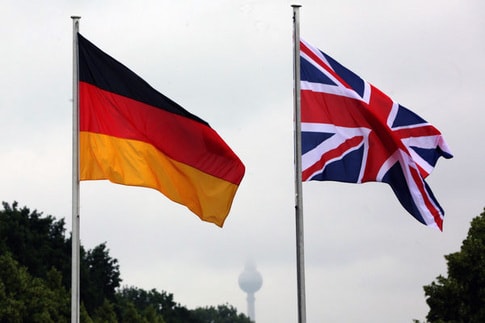 |
| Despite leaving the EU, the UK and Germany remain close partners. Photo: UK Diplomatic |
During a meeting in Berlin on July 20, Angela Merkel and Theresa May expressed their confidence in maintaining this strong relationship, despite Britain's exit from the EU. Merkel said Germany and Britain share "the same beliefs and values", while Theresa May called Germany a "vital partner and special friend".
During the time David Cameron was British Prime Minister, people close to him and Merkel revealed that there were still "undercurrents" between the two.
The two leaders have been at loggerheads over whether Britain should leave or stay in the European Union. While Mr Cameron has bluntly declared his readiness to cut ties with the EU if his party does not win the 2015 general election, Ms Merkel has also been uncompromising in accusing Mr Cameron of acting like a "saboteur".
Not only that, the two have also repeatedly "quarreled" over issues such as Britain's role in Europe, and Mrs. Merkel's failure to prevent Jean-Claude Juncker from being elected President of the European Commission - something Britain has always opposed...
Public opinion hopes that, when No. 10, Downing Street has a new owner, there will be no more "undercurrents" between the two leaders. After all, both women, both strong and straightforward people, they can find a flexible and reasonable approach to issues that still have many differences, as they did with Brexit, so that Britain and Germany can continue to be close partners not only on the continent but also in a series of other frameworks such as NATO, G-20 and G-7.
Thuy Ngoc
| RELATED NEWS |
|---|


